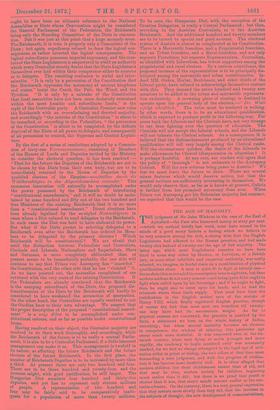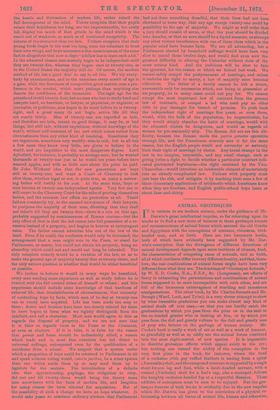THE AGE OF MAJORITY.
THE judgment of Sir John Wickens in the case of the Earl of Aylesford—the Peer who borrowed money at sixty per cent. —which we noticed briefly last week, must have roused in the minds of a good many fathers a feeling which we believe to be very common among the rich, a strong wish that the English
Legislature had adhered to the Roman practice, and had made twenty-five instead of twenty-one the age of full majority. The latter age, which most Englishmen conceive to have been
fixed in some way either by Heaven, or Leviticus, or a British jury, or some other infallible and impartial authority, was really selected, we imagine, in feudal times on a consideration of physical qualifications alone. A man is quite fit to fight at twenty-one— the modern idea as revealed in conscription laws is eighteen, but then modern soldiers do not carry armour—and being quite fit he ought to fight when called upon by his Sovereign ; and if he ought to fight, then he ought also to enter upon his lands, and to lead the retainers whom those lands supply. That must have been the justification in the English nobles' eyes of the statute of Henry VIII. which finally registered English practice, though of course the fact that most men are beardless till twenty- one may have had its unconscious weight. As far as physical reasons are concerned, the practice is justified by the facts, a statement we base on the whole history of Indian recruiting ; but when mental maturity becomes an element in competence, the wisdom of selecting this particular ago seems much more doubtful. It was suspected even in the six- teenth century, when men dying so much younger and more rapidly, the tendency to begin manhood early was necessarily marked, for we find no change attempted in the legal age of ordi- nation either as priest or bishop, the two offices at that time most demanding a sure judgment, and with the progress of civilisa- tion it has become more doubtful still. It is often alleged that modern children lose their childishness sooner than of old, and that may be true, modern society for children beginning much earlier than it did ; but there is no proof that youth is shorter than it was, that men's minds mature earlier as the cen- turies advance. On the contrary, there is a very general impression that they mature more slowly than they did, that the increase in the subjects of thought, the new development of communications,
the bustle and distraction of modern life, rather retard the full development of the mind. Tutors complain that their pupils retain their boyishness too long, are too impressionable, too easily led, display too much of that gristle in the mind which is the result not of weakness, so much as of continued receptivity. The sutures of the character close too late. Fathers complain that their young birds linger in the nest too long, seem too reluctant to trust their own wings, and boys announce a dim consciousness of the same fact in allegations that now-a-days " a fellow has to learn such a lot." In the educated classes men scarcely begin to be independent until they are twenty-five, whereas they began once at twenty-one, as in the United States the majority still do. Of course, the modern method of life has a good deal to say to all this. We try every- body by examinations, and to the examinee every month of age is a gain, while the fierceness of competition gives mature men a pre- ference in the market, which more perhaps than anything else daunts the confidence of the immature. The legal age for the priesthood is still twenty-four, but no man who has to study hard and compete hard, no barrister, or lawyer, or physician, or engineer, or journalist, or politician, now hopes to do much before he is twenty- eight, and a great many do not begin active life till they are nearly thirty. Men of twenty-one are regarded as lads, and therefore are lads, intent on good things, it may be, or bad things, but still lads, without experience, without knowlege of the world, without self-restraint of the sort which comes rather from circumstances than any other kind of teaching. Sometimes they are ingenuous, sometimes very worldly-wise in talk, but in all but a few cases they know very little, are given to believe in the world, and are impulsive to the most dangerous degree. Lord Aylesford, for instance, is probably an average man; but he wanted thousands at twenty-one just as he would ten years before have wanted apples, and with as little care about the price he paid. Sir John Wickens' idea that the new generation are boys still at twenty-one, and want a Court of Chancery to look after them, whether legal or not, is quite true, as many a sorrow- ing father will testify to his cost. At the same time, boys or men become at twenty-one independent agents. Very few can or will resort to the Chancery Court for the sake of proving themselves babies, and the common law offers no protection at all. Timid fathers constantly try, to the amused annoyance of their lawyers, to postpone the majority of their sons, directing that they shall not inherit till they are twenty-five—there is a run on that age, probably suggested by reminiscences of Roman custom—but the only effect of that is that the lad comes into full possession of a re- version instead of a property, and begins to borrow at extravagant rates. The father cannot advertise him out of the law of the land. Even if he could, the confusion would only be increased, the arrangement that a man might vote in the Peers, or stand for Parliament, or marry, but could not obtain his property, being an absurdity which could not and would not long be tolerated. The only complete remedy would be a revision of the law, so as to make the general age of majority twenty-five or twenty-three, and the only serious question is whether that would be either beneficial or possible.
1Ve incline to believe it would in many ways be beneficial, every man needing some experience as well as study before he is trusted with the full control either of himself or others ; and this experience should include some knowledge of that hardness of external life, that irresistibleness of circumstances, that necessity of controlling hope by facts, which men of to-day at twenty-one can so rarely have acquired. Life has been made too easy to them ; desire and fruition have been too closely related for them to have begun to form what we rightly distinguish from the intellect, and call a character. Most men would agree to this as regards the disposal of property, and we are not sure that it is false as regards votes in the Peers or the Commons, or even as electors. If it is false, it is false for the reason that power and force should be indissolubly allied, a reason which leads and in most free countries has led direct to universal suffrage, untempered even by the qualification of a certificate from a school. We suspect that a system under which a proportion of boys could be returned to Parliament to sit and speak without voting would, cmteris paribus, be a wiser system than one which sends them up or may send them up to legislate for the mature. The introduction of a definite idea that apprenticeship, pupilage, the obligation to obey, did not end till twenty-three would bring the theory more into accordance with the facts of modern life, and lengthen for many classes the term allowed for acquisition. But of the possibility of such a change we have no hope whatever. It would take years to convince ordinary electors that Parliament
had not done something dreadful, that their lives had not been shortened in some way, that any age except twenty-one could by I possibility be the age of majority. We might as well order that I a jury should consist of seven, or that the year should be divided into decades, or that an acre should be a liquid measure, or attempt any other violent interference with one of those ideas which in the popular mind have become facts. We are all advancing, but a Parliament elected by household suffrage would have been very slow to cancel those twelve days, and would find even now the greatest difficulty in altering the Calendar without riots of the most serious kind. And the judicious will be slow to face the ignorant, for the reason at which we hinted last week. We cannot safely compel the postponement of marriage, and unless it includes the right to marry, a law of majority soon becomes ridiculous. The father of a family cannot be left a minor, answerable only for necessaries which, not being in possession of his property, he in many cases could not pay for. We cannot except the most important law of contract from the general law of contracts, or compel a lad who need pay no other debt to pay damages for breach of promise. To push back the independent right of marriage five years, or even three, would, with the bulk of the population, be impracticable, for they would simply abandon the habit of marriage, would with the educated classes be dangerous, and would as regards all women be pre-eminently silly. The Roman did not see this dif- ficulty, because the Roman made the patria potestas operative through life, and the Frenchman scarcely sees it for the same reason, but the English people would not surrender or seriously limit their right of marriage by choice. Any broad change in the law is, we imagine, impossible, and any small change, such as giving juries a right to decide whether a particular contract indi- cated protracted boyishness—the right exercised by the Vice- Chancellor—would introduce an intolerable element of uncertainty into an already complicated law. Fathers with property must just bear the risk, and mitigate it by teaching their sons a few of those elementary applications of arithmetic which Americans know when they are fourteen, and English public-school boys learn at about four-and-thirty.







































 Previous page
Previous page